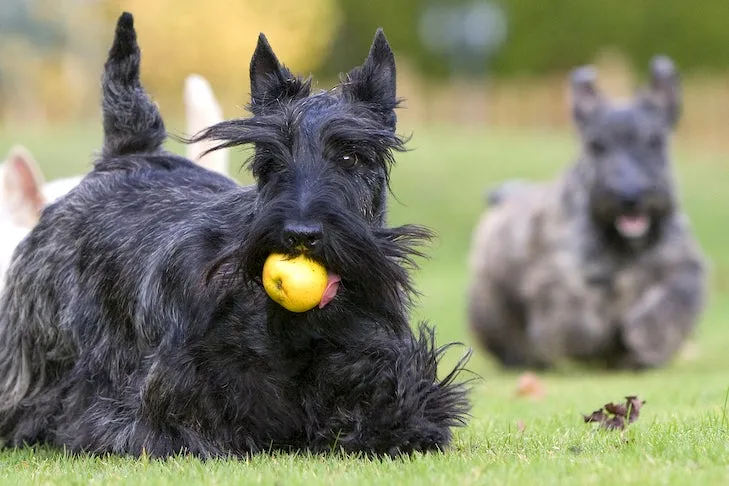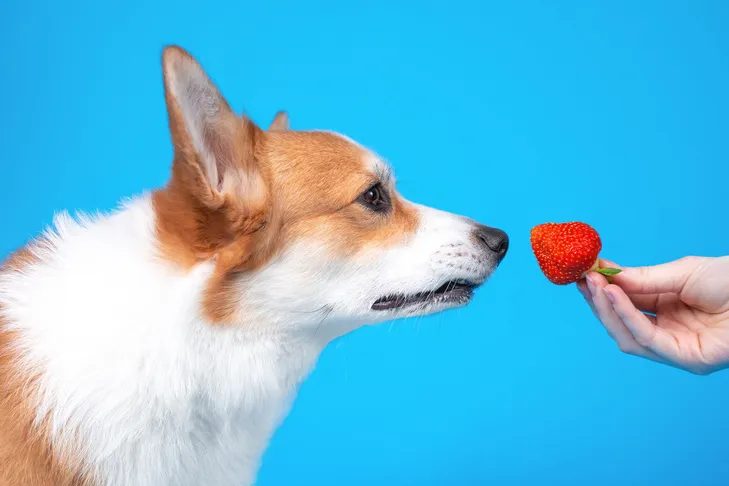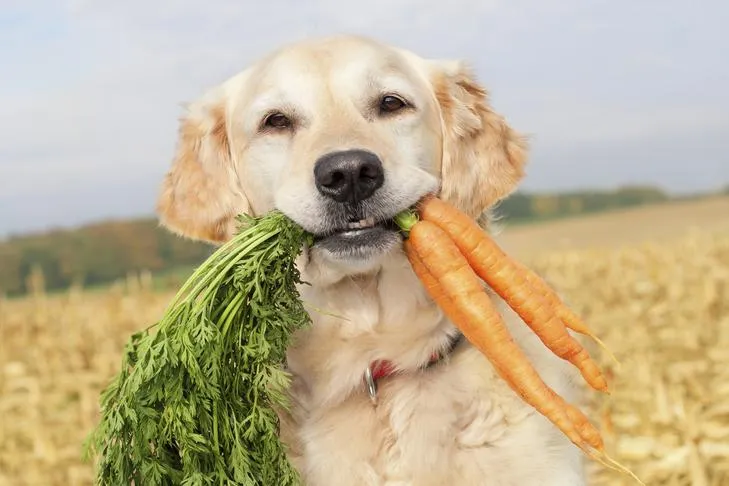As a loving dog owner, the desire to share your favorite human snacks with your furry companion instead of a plain dog treat is completely natural. After all, if it’s safe for you, it must be okay for them, right? Not necessarily. While many human foods are perfectly safe and even beneficial for dogs, some are incredibly unhealthy, and others are downright dangerous. It’s critical to understand the distinctions, especially regarding what vegetables can dogs not have and which fruits and vegetables are safe for their consumption. Dogs process foods differently than humans do, and feeding them the wrong items can lead to long-term health issues and, in severe cases, even be fatal. While dogs, as omnivores, don’t strictly require fruits or vegetables as a core part of their diet, offering dog-safe varieties as occasional treats or snacks is perfectly acceptable. Before you share any snack, make sure to consider if can dogs eat what humans eat safely.
This comprehensive guide will help you navigate the world of human produce, outlining which fruits and vegetables are suitable for sharing in moderation and, more importantly, which should be strictly avoided to ensure your dog’s health and happiness.
Fruits Dogs Can Enjoy Safely
When given in moderation, many fruits can serve as delicious and healthy treats for dogs, providing a natural source of essential vitamins, minerals, and protective antioxidants. Always introduce new foods slowly and in small quantities to observe any adverse reactions. Remember to prepare fruits properly by washing them, removing any pits, seeds, or hard cores, and cutting them into appropriate bite-sized pieces to prevent choking hazards.
Apples
Apples are an excellent source of vitamins A and C, along with dietary fiber, making them a beneficial snack for your dog. Their low protein and fat content also makes them an ideal treat for senior dogs or those watching their weight. Always ensure you remove all seeds and the core before offering apple slices, as apple seeds contain small amounts of cyanide. For a refreshing twist, try them frozen as an icy, warm-weather snack. Many commercial apple-flavored dog treats also incorporate this healthy fruit.
 Scottish Terriers playing in the grass.
Scottish Terriers playing in the grass.
Bananas
In moderation, bananas are a great low-calorie treat for dogs. They are rich in potassium, various vitamins, biotin, fiber, and copper. Additionally, bananas are low in cholesterol and sodium. However, due to their relatively high sugar content, bananas should be given as an occasional treat rather than a regular part of your dog’s main diet. You can even find convenient banana dog treats that stay fresh and delicious.
Blueberries
Often hailed as a superfood, blueberries are packed with antioxidants that help protect against cell damage in both humans and canines. They are also a good source of fiber and beneficial phytochemicals. Blueberries are small and easy for dogs to eat, making them a great option for training or even teaching your dog to catch treats in the air. This powerful fruit is a common ingredient in many blueberry dog treats, sometimes combined with other healthy ingredients like yogurt.
Cantaloupe
Cantaloupe is a nutrient-dense fruit that is low in calories and an excellent source of water and fiber. However, it does contain a higher sugar content, so it should be offered in moderation, particularly for dogs who are overweight or have diabetes. Freezing small balls or cubes of cantaloupe can provide a refreshing and enriching summertime snack for your canine companion.
Cranberries
Both fresh and dried cranberries are safe to feed to dogs in small quantities. While some dogs might enjoy their tart taste, others might be less enthusiastic. Moderation is key when giving cranberries, as with any treat, because an excessive amount can lead to an upset stomach. It’s important to note that many dried cranberries sold for human consumption are sweetened, adding unnecessary sugar to your dog’s diet. Opt for unsweetened fresh or frozen cranberries, or choose crunchy cranberry dog treats if your dog enjoys the flavor.
Cucumbers
Cucumbers are particularly beneficial for overweight dogs due to their minimal carbohydrate and fat content, while offering excellent hydration. They are loaded with essential vitamins K, C, and B1, along with potassium, copper, magnesium, and biotin. Cool cucumber slices make a refreshing hot-weather treat, and you can even freeze them for an engaging enrichment snack that helps keep your dog cool.
 Dog cucumber
Dog cucumber
Mango
This sweet and juicy tropical fruit is a powerhouse of vitamins, containing A, B6, C, and E. Mangoes also provide potassium, beta-carotene, and alpha-carotene. As with most fruits containing a large pit, remember to remove the hard pit first, as it not only poses a choking hazard but also contains small amounts of cyanide. Due to its high sugar content, mango should be given as an occasional treat, especially for dogs prone to weight gain. For a less messy way to provide the benefits of mango’s nutrients, consider a chewy mango dog treat.
Oranges
Veterinarians generally agree that oranges are safe for dogs to eat. However, many dogs are naturally deterred by strong citrus smells or tastes. Oranges are an excellent source of vitamin C, potassium, and fiber. In small amounts, the juicy flesh of an orange can be a tasty treat. Vets recommend discarding the orange peel and only offering your dog the flesh, ensuring all seeds are removed. The peel can be tough on their digestive systems, and the oils might be too intense for their sensitive noses. If fresh citrus isn’t a hit, there are various dog treats with oranges available.
Peaches
Small amounts of fresh or frozen, cut-up peaches are a great source of fiber and vitamin A for dogs. However, similar to cherries, the pit contains cyanide. Ensure the flesh is completely separated from the peach pit, and safely dispose of the pits in dog-proof trash receptacles. Avoid canned peaches, as they typically contain high amounts of sugary syrups. Even those labeled “in natural juice” usually have more sugar than a dog needs. Frozen peach slices can be a delightful and cooling summer enrichment snack.
Pears
Pears are a wonderful snack choice for dogs, being high in copper, vitamins C and K, and fiber. When sharing pears, it’s crucial to cut the flesh into bite-sized chunks and remove the core and seeds first, as the seeds contain traces of cyanide. As with peaches, steer clear of canned or jarred pears that come with sugary syrups, even those claiming to be “in their own juice.” For convenience, you can also find pear dog treats that sometimes incorporate other functional ingredients like duck or salmon.
 Siberian Husky puppy being held up in front of an apple tree.
Siberian Husky puppy being held up in front of an apple tree.
Pineapple
A few chunks of fresh pineapple can be a sweet and enjoyable treat for dogs, provided the prickly outer peel and crown are thoroughly removed. This tropical fruit is packed with vitamins, minerals, and fiber. It also contains bromelain, an enzyme that can aid dogs in absorbing proteins. Like other fruits, avoid canned or packaged pineapple in sweetened syrups, as added sugars are unnecessary and potentially harmful, especially for dogs prone to obesity. For a taste of the tropics on the go, pineapple dog treats are also an option.
Pumpkin
Pure pumpkin is a highly beneficial food for dogs. It’s rich in antioxidants, but its most notable benefit is its ability to help relieve both diarrhea and constipation in dogs. If you’re purchasing canned pumpkin, always choose 100% pumpkin puree, ensuring it’s not pumpkin pie filling, which contains spices and added sugars harmful to dogs. Alternatively, you can roast pumpkin yourself and feed your dog the peeled, cooked flesh. Many pumpkin supplements and pumpkin dog treats are also available.
Raspberries
Raspberries are safe for dogs in moderation and offer several health benefits due to their antioxidant content. They are low in sugar and calories but high in fiber, manganese, and vitamin C. Raspberries are particularly good for senior dogs as they possess anti-inflammatory properties, which can help support aging joints. However, raspberries contain small, naturally occurring amounts of xylitol, a substance toxic to dogs. Therefore, limit your dog to no more than 8 ounces of fresh or frozen raspberries at a time. Dog treats that include raspberry as an ingredient are also a safe option.
Strawberries
Strawberries are full of fiber and vitamin C, and they contain an enzyme that can even help whiten your dog’s teeth. Like all fruits, strawberries contain natural sugars, so offer them in moderation. Frozen strawberries can provide an entertaining enrichment treat. Alternatively, you can enjoy the strawberries yourself and use a fun strawberry-shaped snuffle mat to hide your dog’s favorite strawberry training treat.
 Pembroke Welsh corgi and strawberry
Pembroke Welsh corgi and strawberry
Watermelon
Dogs can eat watermelon, but it’s crucial to remove the rind and seeds first, as these can cause intestinal blockage. The flesh of watermelon is safe for dogs and is rich in vitamins A, B-6, and C, as well as potassium. Comprising 92% water, watermelon is an excellent way to help keep your dog hydrated, especially on hot summer days. Freezing chunks of seeded watermelon provides a fun hot-weather enrichment treat. You can even find specially formulated watermelon-flavored dog treats. Remember, for more options on healthy snacks, you can also explore what can you feed to dogs beyond fruits and vegetables.
Fruits Dogs Must Avoid
While certain fruits are perfectly healthy for humans, they may contain compounds, seeds, or parts that are dangerous, if not outright toxic, to dogs. It is best to keep these fruits completely out of your dog’s reach to ensure their safety and well-being.
Avocado
Although avocado can be a healthy snack for humans, it should not be given to dogs. The pit, skin, and leaves of avocado plants contain persin, a toxin that frequently causes vomiting and diarrhea in dogs. While the fleshy inside of the avocado fruit contains less persin than other parts of the plant, it can still be too much for dogs to safely process. Moreover, avocado flesh is high in fat, which can lead to gastrointestinal upset or contribute to serious health conditions like pancreatitis if consumed in large quantities. Your dog can still benefit from avocado’s healthy fats if you choose dog treats for skin and coat that include avocado in the ingredients.
Cherries
With the exception of the fleshy fruit around the seed, cherry plants, including the stems, leaves, and pits, contain cyanide and are toxic to dogs. Cyanide disrupts cellular oxygen transport, which means your dog’s red blood cells cannot adequately deliver oxygen throughout the body. If you have a cherry tree, ensure your dog doesn’t have access to fallen fruit. If your dog consumes whole cherries or cherry pits, watch for signs of cyanide poisoning, such as dilated pupils, difficulty breathing, and red gums, which constitute a veterinary emergency. When eating cherries yourself, secure discarded pits in a dog-proof trash can, and educate children not to share cherries or their pits with the dog. To safely allow your dog to experience the antioxidant benefits that cherries offer, consider cherry-flavored dog treats.
Grapes
If you suspect your dog has eaten grapes or raisins, contact your veterinarian immediately. Grapes and raisins are highly toxic to dogs, regardless of breed, sex, or age, and can lead to acute sudden kidney failure. Always be extremely cautious with this dangerous fruit around dogs, especially if children in your home consume grapes or raisins. When disposing of grapes or raisins, do not place them in a compost heap accessible to your dog. Ensure your trash can is dog-proof or positioned where your pet cannot reach it.
Tomatoes
While the ripened flesh of the tomato fruit is generally considered safe for dogs, the green parts of the tomato plant, including stems and leaves, contain a toxic substance called solanine. Although a dog would typically need to ingest a large quantity of the plant to become ill, it is safer to avoid feeding tomatoes altogether. If your dog enjoys exploring your vegetable garden, take measures to prevent them from accessing your tomato plants. Keeping track of what food items can dogs not eat is vital for their safety.
 Rottweiler laying down in the yard, its head tilted.
Rottweiler laying down in the yard, its head tilted.
Vegetables Dogs Can Enjoy Safely
Understanding which vegetables are safe for your dog is paramount to providing a healthy and balanced diet. While many vegetables can offer valuable nutritional benefits, some can be toxic or harmful. Here is a list of vegetables that you can confidently chop up and share with your dog as healthy additions to their diet.
Broccoli
Broccoli is safe for dogs to eat in small amounts and is best served as an occasional treat. It’s rich in fiber and vitamin C and low in fat. However, broccoli florets contain isothiocyanates, which can cause mild to potentially severe gastric irritation in some dogs if consumed in large quantities. The tough stalks of broccoli have also been known to cause obstructions in the esophagus. If your dog enjoys broccoli, it is generally better to offer it cooked to help mitigate these potential issues. Alternatively, a broccoli-shaped dog chew toy can satisfy their urge to gnaw.
Brussels Sprouts
Brussels sprouts are packed with beneficial nutrients and antioxidants that are great for both humans and dogs. However, moderation is crucial, as overfeeding them can lead to significant gas and digestive discomfort in your dog. If your dog is a big fan of Brussels sprouts and you can tolerate the digestive consequences, you might consider some dehydrated dog foods that include these leafy greens as an ingredient.
Carrots
Carrots are an excellent, low-calorie snack that is high in fiber and beta-carotene, which the body converts into vitamin A. Additionally, the crunchy texture of this orange root vegetable is great for helping to clean your dog’s teeth. Carrots are a common ingredient in many dog foods and are also featured in plenty of carrot dog treats.
 Golden Retriever holding carrots.
Golden Retriever holding carrots.
Celery
Beyond providing vitamins A, B, and C, celery contains nutrients that can promote a healthy heart and potentially help in the fight against cancer. As an added bonus, celery is also known for its ability to freshen doggy breath. Many dogs enjoy celery dog chews as a fun and healthy treat.
Green Beans
Whether chopped, steamed, raw, or canned (plain), all types of green beans are safe for dogs to eat. They are rich in important vitamins and minerals, high in fiber, and low in calories. For dogs, opt for no-salt canned green beans when adding them to their food. Frozen green beans can also serve as enjoyable enrichment snacks, particularly on warm days.
Peas
Green peas, snow peas, sugar snap peas, and garden or English peas are all acceptable for dogs to consume occasionally. Peas contain several vitamins, minerals, and are rich in protein and high in fiber. You can feed your dog fresh or frozen peas, but it is best to avoid canned peas due to their high sodium content.
Spinach
Dogs can eat spinach, but it isn’t always the top recommendation among safe vegetables. Spinach is high in oxalic acid, which can interfere with the body’s ability to absorb calcium and potentially lead to kidney damage. While a dog would likely need to consume a very large amount of spinach for this problem to arise, it might be safer to choose other vegetables. If you wish for your dog to benefit from this leafy green, spinach dog treats can be given as an occasional snack.
Vegetables Dogs Must Avoid
While many vegetables can be a healthy and beneficial addition to a dog’s diet, others can be toxic or harmful for them to consume. This section specifically addresses What Veggies Can Dogs Not Have, ensuring these harmful items do not make their way into your dog’s bowl. It’s crucial for every dog owner to be aware of what vegetables are harmful to dogs to protect their pets.
Asparagus
While asparagus is not inherently unsafe for dogs, there is little to no nutritional benefit in feeding it to them. It is too fibrous and tough to be eaten raw, and by the time it is cooked down to a soft enough consistency for dogs, much of its nutritional value is lost. If you’re looking to share a vegetable with your dog, there are many other options that offer far greater benefits and are easier for them to enjoy.
Mushrooms
Wild mushrooms can be extremely toxic for dogs. Although only a small percentage (50-100 out of 50,000 species) are known to be poisonous, those that are toxic can cause severe illness or even be fatal. It is always best to assume any wild mushroom is dangerous and prevent your dog from consuming them. Washed mushrooms purchased from a reputable supermarket for human consumption are generally fine for dogs; however, it’s always safer to err on the side of caution.
Onions
Dogs should absolutely never eat onions. If you suspect your dog has consumed onions, contact your veterinarian immediately. Onions, along with leeks and chives, belong to the Allium family of plants, which are poisonous to most pets, particularly cats. Ingesting onions can cause a dog’s red blood cells to rupture, leading to symptoms such as vomiting, diarrhea, stomach pain, and nausea. Poisoning from onions can be more severe in Japanese breeds like Akitas and Shiba Inus, but all dogs are highly susceptible. If there are children in your household, ensure they do not share foods containing onions with your dog, and secure all leftovers where your dog cannot access them.
Conclusion
Understanding what vegetables can dogs not have, as well as which fruits and vegetables are safe for them, is a vital part of responsible pet ownership. While the desire to share your food with your beloved canine is strong, always remember that their digestive systems and nutritional needs are different from ours. Many common human foods, though healthy for us, can be dangerous or even deadly for dogs.
Always err on the side of caution. Before introducing any new fruit or vegetable into your dog’s diet, research its safety, prepare it properly by removing seeds, pits, and rinds, and offer it in moderation. When in doubt, it’s always best to consult your veterinarian for personalized advice. By being mindful and informed, you can ensure your dog enjoys a safe, healthy, and happy life, free from preventable dietary hazards. For more insights into canine nutrition and care, explore other helpful articles on Dog Care Story.
